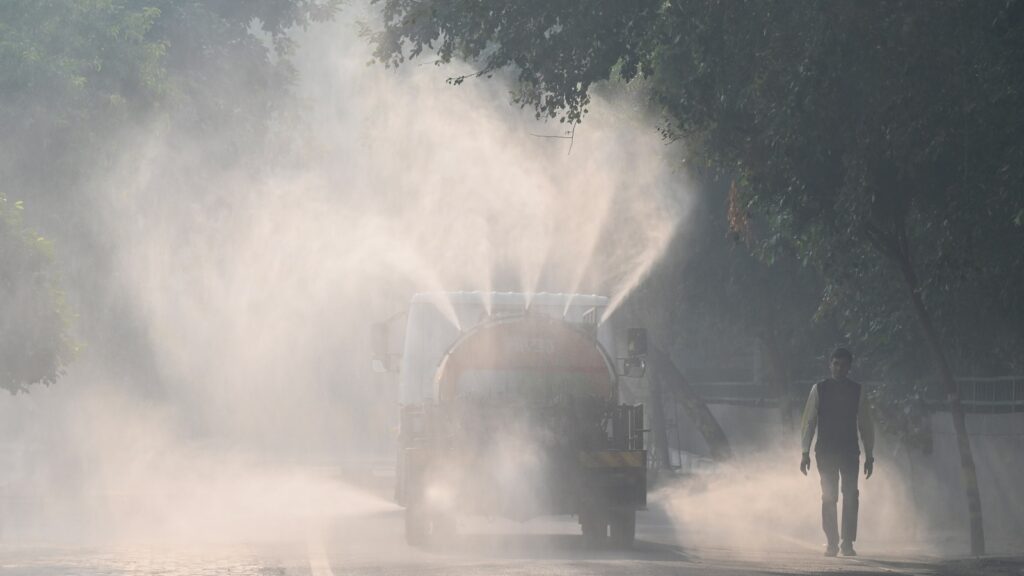Delhi air pollution: Supreme Court flags GRAP-4 lapses, seeks report on heavy vehicles’ entry | Latest News India

The Supreme Court on Friday resumed hearing in the plea seeking directions to curb air pollution in Delhi-NCR. The Air Quality Index (AQI) had hit ‘severe-plus’ levels earlier this week, necessitating the implementation of Stage 4 of the Graded Response Action Plan (GRAP), which bans truck entry and temporarily halts construction at public projects.

The Supreme Court held that the Delhi government and city police failed to implement GRAP Stage 4 restrictions regarding heavy vehicles entering the Capital. The apex court sought CCTV camera footage from all 13 major entry points to verify whether heavy vehicles had actually been permitted in.
The Supreme Court appointed 13 lawyers to visit the 13 points and submit a report before Monday, November 25, on whether the heavy vehicles and light commercial vehicles (LCVs) registered outside Delhi not carrying essential items are being allowed. The Supreme Court will take up the matter on Monday.
During the last hearing earlier this week over air pollution in Delhi and its nearby cities of Noida, Ghaziabad, Gurugram and Faridabad – all of which fall under NCR – the Supreme Court directed all Delhi-NCR states to immediately set up teams to strictly enforce anti-pollution GRAP 4 restrictions, making it clear that the curbs will continue till further orders.
Supreme Court hearing on Delhi pollution | Key points
-The Supreme Court on Friday said it is very difficult for it to assume that entry of trucks in the national capital, banned under GRAP 4, has been stopped. “It is very difficult for us to assume that entry of trucks in Delhi has been stopped,” observed the bench of Justices Abhay S Oka and Augustine George Masih. The bench said it proposes to direct the Centre to depute police personnel at all 13 points to check the entry of trucks in Delhi and submit a report by November 25, when the matter is heard next.
-The Supreme Court on Monday, November 18, asserted that it is the constitutional duty of all states to ensure all citizens live in a pollution-free environment and directed that the GRAP Stage 4 continues till AQI drops below 450. The
-Delhi’s daily average Air Quality Index (AQI) rose sharply to 457 by 7 pm on Sunday, and further escalated to 485 – severe-plus category – by 9 am on Monday morning, according to data from the Central Pollution Control Board (CPCB).
-The Graded Response Action Plan (GRAP) for the National Capital Region (NCR) is classified under four different stages of adverse air quality in Delhi: Stage I — ‘poor’ (AQI 201-300); Stage II — ‘very poor’ (AQI 301-400); Stage III — ‘severe’ (AQI 401-450); and Stage IV — ‘severe plus’ (AQI >450).
-The top court on Monday also faulted the Commission for Air Quality Management (CAQM) for “delaying” the implementation of Graded Response Action Plan (GRAP) and said it followed a “wrong” approach. “Needless to add, it is a constitutional obligation of the central government and the states to ensure that citizens live in a pollution-free atmosphere. Therefore, in addition to actions which are proposed under stages 3 and 4, all possible actions shall be taken at the level of these governments, to ensure that the AQI is brought down,” news agency PTI quoted the bench as saying.
-The Supreme Court bench said the approach adopted by the CAQM seems to be that it decided to wait for improvement of the AQI and therefore implementation of Stage 3 and Stage 4 was delayed. “This is a completely wrong approach. Even in anticipation of the AQI crossing the threshold limit, it is the duty of the Commission to start immediate implementation of GRAP-3 and GRAP-4 as the case may be. The Commission cannot wait for improvement for the AQI,” the bench said.




